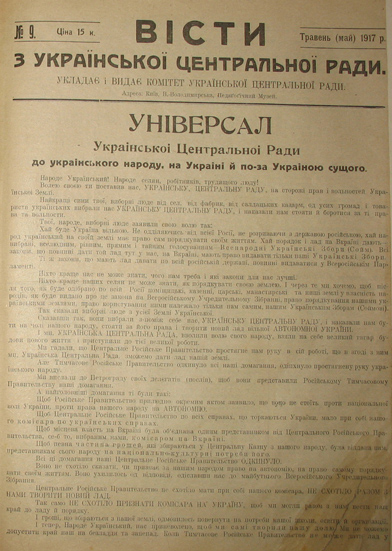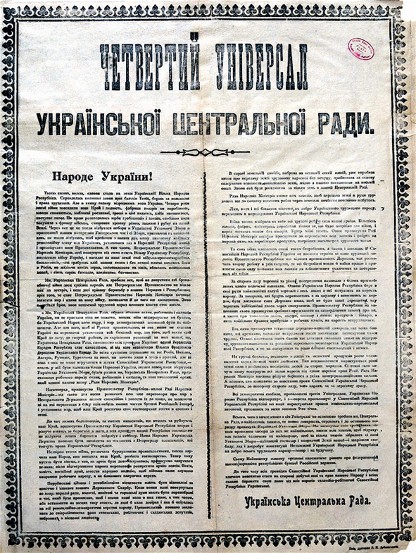Universals of the Central Rada
Universals of the Central Rada. In 1917–18 the Ukrainian Central Rada (CR) adopted and promulgated four edicts possessing the significance of fundamental laws and reflecting the evolution of the Ukrainian state from autonomy within Russia to independence. Like the edicts of the 17th- and 18th-century Hetman state, they were called universals. The universals were published in the official CR organ, Visty z Ukraïns’koï Tsentral’noï Rady, and most newspapers, broadcast by radio, and posted throughout Ukraine on placards printed in Ukrainian, Russian, Polish, and Yiddish. The author of the First Universal was Volodymyr Vynnychenko; he also coedited the Second and Third universals. The Fourth Universal was cowritten by Mykhailo Hrushevsky, Mykyta Shapoval, and Vynnychenko. The First Universal was proclaimed at the Second All-Ukrainian Military Congress; the Second, at a CR session. The Third and Fourth universals were voted on as bills and passed at sessions of the Little Rada.
In the First Universal (23 June 1917) the CR proclaimed Ukraine's autonomy (‘from this day on we alone will create our life’). Referring to the hostility of the Russian Provisional Government's rejection of the demands put to it by the CR delegation in Petrograd, it stated, ‘without seceding from all of Russia ... let the Ukrainian people have the right to manage its own life on its own soil,’ and called for the creation of a democratically elected all-Ukrainian people's assembly, which would have the sole right to draft laws that would be confirmed later by the All-Russian Constituent Assembly. It appealed to the national minorities for support and co-operation and introduced a special public tax as the basis of the CR treasury. Five days later the first government of autonomous Ukraine, the General Secretariat of the Central Rada, was appointed.
The Second Universal (16 July 1917) reflected the results of the 12–13 July negotiations between the General Secretariat and Provisional Government representatives in Kyiv. Addressed to the ‘citizens of the Ukrainian land’ instead of, as in the First Universal, ‘the Ukrainian people,’ it proclaimed that the CR would be expanded to include representatives from the national minorities, and would thereby become ‘the single supreme body of revolutionary democracy in Ukraine.’ A new General Secretariat would be appointed and would be ‘subject to confirmation by the Provisional Government as the repository of the highest regional authority of the Provisional Government in Ukraine.’ The CR would ‘prepare drafts of legislation for Ukraine's autonomous structure,’ would submit them for confirmation to the All-Russian Constituent Assembly, and would not take any steps to establish Ukrainian autonomy until the assembly was convoked. The formation of separate Ukrainian military units would be subject to the approval of the Russian minister of war.
The Third Universal (20 November 1917) was issued after the Bolshevik coup in Petrograd. Addressed to ‘the Ukrainian people and all the peoples of Ukraine,’ it proclaimed the creation of the Ukrainian National Republic within a federated Russia of equal and free peoples. The Ukrainian National Republic would be governed by the Central Rada and General Secretariat of the Central Rada until the convocation of the Constituent Assembly of Ukraine. The universal abolished capital punishment and the ownership of land by nontoilers; declared all land the property of the working people without compensation to its former owners; introduced an eight-hour workday and state control over all production; stated that the Central Rada would ‘use resolute means to force ... both allies and enemies to begin peace negotiations at once’; granted full amnesty to all political prisoners and national-personal autonomy to Ukraine's national minorities; directed the General Secretariat to strengthen and broaden the local self-government rights; affirmed the freedom of speech, the press, religion, assembly, and association, the right to strike, and the inviolability of the person and the home; called upon all citizens to ‘struggle decisively against all anarchy and destruction’ (ie, the Bolsheviks); and set 9 January 1918 as the date for election of the Constituent Assembly of Ukraine and 22 January as the day of its convocation.
The Fourth Universal (22 January 1918) was issued after the Ukrainian-Soviet War, 1917–21 began. Denouncing the Bolshevik aggression and expressing the desire for peace, it proclaimed the Ukrainian National Republic an ‘independent, subject to no one, free, sovereign state of the Ukrainian people.’ The universal renamed the General Secretariat the Council of National Ministers of the Ukrainian National Republic, directed it to negotiate an independent peace treaty with the Central Powers and to ‘struggle firmly against all counterrevolutionary forces,’ and called on all citizens to defend their welfare and liberty and to drive out the Bolsheviks. It announced an immediate end to the war and promised that the army would be replaced by a people's militia after the ratification of the peace treaty; prescribed new elections to rural-district, county, and urban popular councils; affirmed that a land law would soon be ratified and that all land would be transferred from the land committees to the people before spring tilling; nationalized all natural resources and the most important branches of commerce; directed the Council of National Ministers immediately to change over industry to peacetime production, to increase the industry of the state, to solve unemployment, and to ensure the welfare of the handicapped; introduced state supervision of imports, exports, and monopolies to prevent speculation and excessive profits by the bourgeoisie; imposed state control over banks so that loans could thenceforth ‘primarily ... support the working population and the economic development of the Ukrainian National Republic’; and reaffirmed all democratic freedoms and national-personal autonomy. Although the universal was antedated to the day the Constituent Assembly of Ukraine was to convene but could not, it was in fact passed by the Little Rada on 25 January 1918.
BIBLIOGRAPHY
Hrushevs’kyi, M. Ukraïns’ka Tsentral’na Rada i ïï universaly pershyi i druhyi, 3 edns (Kyiv 1917)
—Na porozi novoï Ukraïny: Hadky i mriï (Kyiv 1918)
Khrystiuk, P. Zamitky i materiialy do istoriï ukraïns’koï revoliutsiï 1917–1920 rr., vols 1–2 (Vienna 1921; repr, New York 1969)
Doroshenko, D. Istoriia Ukraïny 1917–1923 rr., vol 1, Doba Tsentral’noï Rady (Uzhhorod 1930; repr, New York 1954)
Kostiv, K. Konstytutsiini akty vidnovlenoï ukraïns’koï derzhavy 1917–1919 rokiv i ïkhnia politychno-derzhavna iakist’ (Toronto 1964)
Hunczak, T. (ed). The Ukraine, 1917–1921: A Study in Revolution (Cambridge, Mass 1977)
Verstiuk, V. (ed.) Ukraïns’ka Tsentral’na Rada: dokumenty i materiialy v dvokh tomakh (Kyiv 1996–7)
Arkadii Zhukovsky
[This article originally appeared in the Encyclopedia of Ukraine, vol. 5 (1993).]


